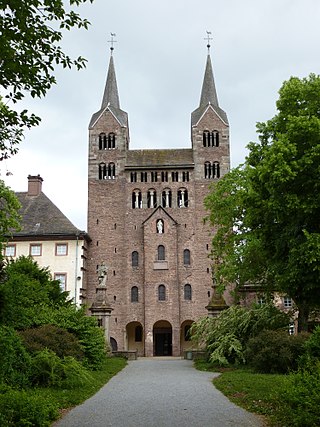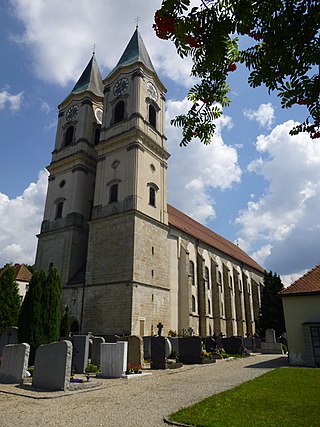See also
Name list
This page or section lists people that share the same given name or the same family name. If an internal link led you here, you may wish to change that link to point directly to the intended article.
Volkmar, Folkmar or Folcmar is a given name, Volkmar later also a surname. Notable people with the name include:

The Prince-Bishopric of Brandenburg was an ecclesiastical principality of the Holy Roman Empire from the 12th century until it was secularized during the second half of the 16th century. It should not be confused with the larger Diocese of Brandenburg established by King Otto I of Germany in 948, in the territory of the Marca Geronis east of the Elbe river. The diocese, over which the prince-bishop exercised only spiritual authority, was a suffragan diocese of the Archdiocese of Magdeburg, its seat was Brandenburg an der Havel.

Year 990 (CMXC) was a common year starting on Wednesday of the Julian calendar.
Arnulf is a masculine German given name. It is composed of the Germanic elements arn "eagle" and ulf "wolf". The -ulf, -olf suffix was an extremely frequent element in Germanic onomastics and from an early time was perceived as a mere suffix forming given names. Similarly, the suffix -wald, -ald, -old, originally from wald "rule, power" underwent semantic weakening. Therefore, the name Arnulf and Arnold were often conflated in early medieval records, as is the case with bishop Arnulf of Metz, especially as the final consonant came to be dropped (Arnoul).
Theodosius is a given name. It may take the form Teodósio, Teodosie, Teodosije etc. Theodosia is a feminine version of the name.
Anselm may refer to:

Gotthard, also known as Gothard or Godehard the Bishop, was a German bishop venerated as a saint.
Eberhard is an old Germanic name meaning the strength or courage of a wild boar.
Notker or Notger is a masculine Germanic given name. It may refer to:

The Princely Abbey of Corvey is a former Benedictine abbey and ecclesiastical principality now in North Rhine-Westphalia, Germany. It was one of the half-dozen self-ruling princely abbeys of the Holy Roman Empire from the Late Middle Ages until 1792 when Corvey was elevated to a prince-bishopric. Corvey, whose territory extended over a vast area, was in turn secularized in 1803 in the course of the German mediatisation and absorbed into the newly created Principality of Nassau-Orange-Fulda. Originally built in 822 and 885 and remodeled in the Baroque period, the abbey is an exceptional example of Carolingian architecture, the oldest surviving example of a westwork, and the oldest standing medieval structure in Westphalia. The original architecture of the abbey, with its vaulted hall and galleries encircling the main room, heavily influenced later western Romanesque and Gothic architecture. The inside of the westwork contains the only known wall paintings of ancient mythology with Christian interpretation in Carolingian times. The former abbey church was listed as a UNESCO World Heritage Site in 2014.
Odo is a name typically associated with historical figures from the Middle Ages and before. Odo is etymologically related to the names Otho and Otto, and to the French name Odon and modern version Eudes, and to the Italian names Ottone and Udo; all come from the Germanic word ot meaning "possessor of wealth".

Gröningen Priory was a Benedictine monastery, located west of Gröningen in present-day Saxony-Anhalt, Germany. The abbey church is part of the Romanesque Road scenic route.
Rikdag, also called Ricdag, Riddag, or Rihdag, was Margrave of Meissen from 979 until his death. In 982, he also acquired the marches of Merseburg and Zeitz. After the Great Slav Rising in 983, he temporarily reunited all of the southern marca Geronis under his command. His march included the territory of the Chutizi and Dolomici tribes.

Niederaltaich Abbey is a house of the Benedictine Order founded in 741, situated in the village of Niederalteich on the Danube in Bavaria.
Manasses or Manasseh is a biblical Hebrew name for men. It is the given name of seven people of the Bible, the name of a tribe of Israel, and the name of one of the apocryphal writings. The name is also used in the modern world.
Lothair I was Margrave of the Nordmark from about 983 until his death. He was also a member of Saxon nobility as Count of Derlingau and of Nordthüringgau.
Theodoric I was a nobleman in the Duchy of Saxony, and the oldest traceable member of the House of Wettin.
Siegfried is a German-language male given name, composed from the Germanic elements sig "victory" and frithu "protection, peace". The German name has the Old Norse cognate Sigfriðr, Sigfrøðr, which gives rise to Swedish Sigfrid, Danish/Norwegian Sigfred. In Norway, Sigfrid is given as a feminine name.
Folcmar, also named Poppo, was a bishop of Utrecht from 976 to 990.
Burchard are both Germanic given names and surnames, from Burg "castle" and hart "hard". Notable people with the name include:
Lothar II the Elder, Count of Walbeck, son of Lothar I, Count of Walbeck.